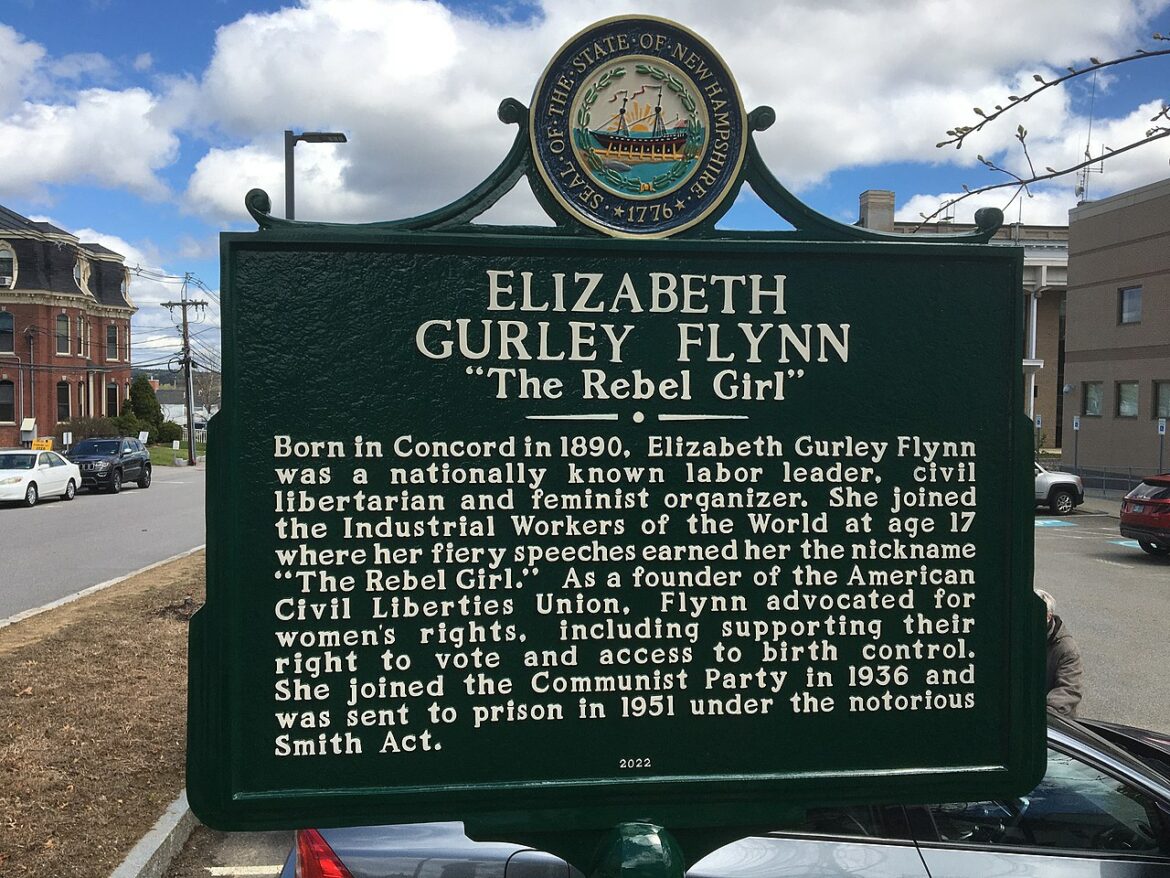By Staff Report &
News release
CONCORD – The two New Hampshire residents who petitioned the state’s Division of Historical Resources to establish a historical marker near the birthplace of Elizabeth Gurley Flynn filed suit Monday in Merrimack County Superior Court calling for the Flynn marker, which the state dedicated on May 1 and removed on May 15, to be reinstalled.
According to the complaint submitted by Attorney Andru Volinsky on behalf of Mary Lee Sargent and Arnie Alpert, the plaintiffs “are without remedies at law or in equity other than the restoration of the Flynn Marker to its location near Montgomery and Court Streets in Concord.”
The marker was criticized publicly by Gov. Chris Sununu and Executive Councilor Joe Kenney, R-Wakefield, among others.
Kenney didn’t immediately respond to a request for comment about the lawsuit, but Sununu sent an email via his spokesman.
“America is a free country, and we appreciate their ability to sue the government for a decision they might disagree with — a privilege not afforded to citizens in communist countries. An avowed communist who benefited from a state funeral in Moscow’s Red Square should not be celebrated in New Hampshire. All policies were followed when removing this Anti-American sign and it will not be coming back under my watch,” Sununu said.
According to a news release from Alpert and Sargent, Elizabeth Gurley Flynn was a prominent leader in the early twentieth century labor movement where, in the words of the historical marker, “her fiery speeches earned her the nickname, ‘The Rebel Girl.’” Flynn was also known as an advocate for women’s equality and as a fierce defender of civil liberties. At age 46, she joined the Communist Party, in which she was a member until her death in 1964.
“It was her communist affiliation which attracted the ire of Executive Councilor Joe Kenney, who two days after the Flynn marker was installed demanded it be removed. Governor Sununu agreed, and the marker was taken away by the Department of Transportation on May 15 upon the order of Sarah Stewart, Commissioner of the Department of Natural and Cultural Resources, which includes the Division of Historical Resources,” the release said.
Sargent said, “The marker was illegally removed based on ideological considerations that fly in the face of the historical marker program’s purpose.” Sargent taught American history for several decades at colleges and universities in the Midwest and in New Hampshire.
The legal complaint states that “the State of New Hampshire, by and through Governor Chris Sununu, Executive Councilor Joseph Kenney, and Commissioners Sarah Crawford Stewart of the Department of Natural and Cultural Resources and William Cass of the Department of Transportation … violated state law, including, but not limited to, the State’s Administrative Procedures Act, R.S.A. 541-A; the Historic Markers Program, R.S.A. 227-C:5 and 236:40; and the Plaintiffs’ rights to the due process of law as guaranteed by the New Hampshire Constitution by interfering with the Plaintiffs’ right to duly petition for the approval and erection of a historical marker near the birthplace of Elizabeth Gurley Flynn in Concord, New Hampshire.”
The Historical Marker Program was established under R.S.A. 236:40, which provides, “The commissioner of transportation may erect historic markers or signs within the right-of-way of any class I, II or III highway. He shall put up a marker upon the petition of 20 or more state citizens.”
According to the lawsuit, the policies and guidelines which the DNCR uses to run the program are invalid because their adoption was not consistent with the requirements of the Administrative Procedures Act.
Neither were rules governing historical markers ratified by the State Historical Resources Council, as required by RSA 227:C5, the complaint said.
Moreover, the complaint asserts, Commissioner Stewart did not follow her own invalid guidelines, which require DNCR to consult with the State Historical Resources Council before markers are “retired,” the release said.
Nor is there anything in the law or DNCR guidelines which provide for markers to be removed “on grounds of political or personal ideology,” the complaint says.
“Commissioner Stewart herself told Councilor Kenney that the purpose of the marker program is to inform the public about New Hampshire history,” said Alpert, a longtime New Hampshire activist.
Describing appropriate subjects for historical markers, the Division of Historical Resources policy statement also says, “The person, place, event, organization, or innovation to be marked had a significant impact on its times and has demonstrated historical significance.”
Alpert said, “There is no doubt that Elizabeth Gurley Flynn was a significant historical figure.”
The complaint asked the court to declare the existing policies of the historical marker program invalid, to declare that Commissioner Stewart violated the plaintiffs’ rights, and order the Flynn marker to be reinstalled at its prior location, the release said.
Monday was the 133rd anniversary of Elizabeth Gurley Flynn’s birth to Annie Gurley and Thomas Flynn, who at the time were living at 12 Montgomery Street in Concord.
Disclaimer: Arnie Alpert writes the column Active with the Activists for InDepthNH.org and Andru Volinsky represents InDepthNH.org in its lawsuit against the attorney general seeking to make public all names on the Laurie List of police officers with credibility issues.






